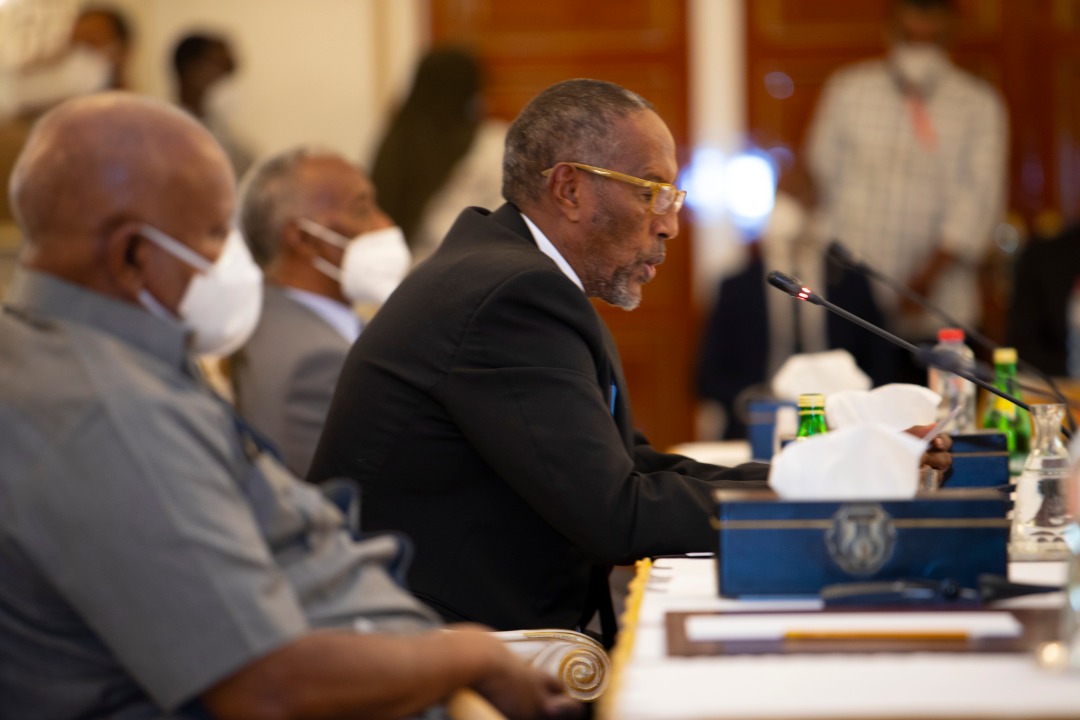Somalia-Somaliland talks collapse as Bihi asserts two-state solution

By T. Roble
“Somaliland insists that dialogue should be two-state process with substantive agenda that addresses the core issues of the dispute,” Somaliland’s Muse Bihi set the record straight in what sources at the meeting told Goobjoog News led to the collapse of the first round of talks in Djibouti.
In his opening address, Bihi was categorical- the talks are between two independent states-Somalia and Somaliland contrary to Mogadishu’s position which views Somaliland as its province.
Bihi lay the groundwork for what his team believed to be the direction for the Djibouti mediated talks. Setting a historical study of the relationship between the two countries since the Act of Union in 1960, Bihi said unlike other states in the continent and beyond that ultimately broke up to create new nations, Somaliland was far more unique as it was initially an independent state before acceding to a voluntary union with then Italian Somaliland.
RESTORATION OF INDEPENDENCE
“Somaliland has long argued that the Somali Republic was two united countries. The failure of the unity government provided adequate ground to the restoration of our independence,” Bihi prosecuted his case as President Mohamed Farmaajo and others parties to the talks followed pensively.
According to Bihi, Somaliland is not attempting to secede from Somalia but just endevours to return to default settings. “Somaliland pursuit of independence is not a case of secession but rather the dissolution of a voluntary union between independent states.”
Bihi was not hesitant to present history lessons citing countries such as Mali, Senegal, Zambia and Egypt which ‘have all withdrawn from unions with their borders intact’. The African Union also accepted independence for territories ‘that previously enjoyed full sovereignty, Bihi, the 5th President of Somaliland said.
BRICK WALL
Sources at the meeting said Bihi’s statement set the tone for the collapse of the talks since engagements have always centred on the issue of self-determination by Somaliland. Among those key figures who were behind the talks are Ethiopia’s Abiy Ahmed, US ambassador to Somalia Donald Yamamoto and representatives from Gulf countries.
By the time Bihi was summing up his speech, sources said, the talks had already headed south adding, ‘a communique was being hushed to save face’.
To hit the last nail on the coffin for the talks, Bihi wondered if the talks in Djibouti would produce any tangible results yet previous meetings have yielded none. “Today how can we proceed with this dialogue if the previously signed agreements in London, Istanbul, Accra and Djibouti were not implemented yet,” the former military man who took over from Ahmed Silanyo as President in 2017 paused.
MATCH WORDS WITH ACTIONS
“We cordially propose that a serious mechanism and a guarantor should be in place for this new round of dialogue.”
Bihi was not done with Mogadishu in his 17 minutes long speech. Farmaajo’s apology to Somaliland for atrocities committed to the northern region by Said Barre ‘is significant and heartfelt by all Somalilanders’, said Bihi but actions must speak louder than words.
“Word are not enough; again, words are not enough. The horror of the past requires more than words; it requires actions, the act of recognizing and supporting the independence of Somaliland would go a long way to heal the wounds of the past and enable our states to embrace each other in our independence but closely interwoven futures.”
A brief communique from the talks said the two sides agreed to leave a follow-up of the talks to a technical committee.